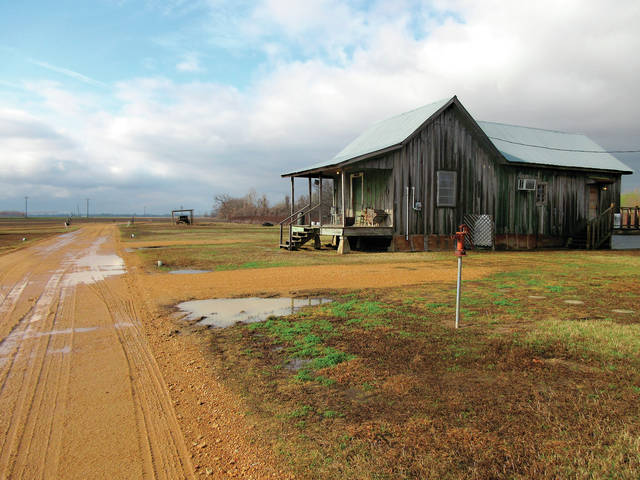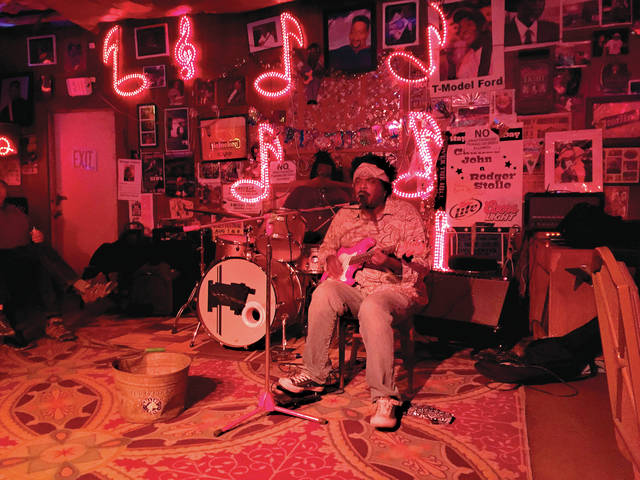CLARKSDALE, Miss. — The Mississippi Delta has no shortage of museums, historic attractions and clubs devoted to the blues. But visitors will find the region has many other stories to tell, from the cotton plantations where African-American families worked and lived in desperate poverty to culinary traditions that reflect a surprising ethnic diversity.
CLARKSDALE, Miss. — The Mississippi Delta has no shortage of museums, historic attractions and clubs devoted to the blues. But visitors will find the region has many other stories to tell, from the cotton plantations where African-American families worked and lived in desperate poverty to culinary traditions that reflect a surprising ethnic diversity.
THE BLUES TRAIL AND MUSEUMS
You can’t miss the big blue guitars marking the famous crossroads of Highways 61 and 49 in Clarksdale. This is where, according to legend, Robert Johnson sold his soul to the devil to learn how to play the blues.
Roadside signs for the Mississippi Blues Trail make it easy to find other sites as well, from Clarksdale’s Riverside Hotel, where Bessie Smith died, to the Dockery Farms cotton plantation in Cleveland, where many pioneering bluesmen lived, worked and made music, among them Charley Patton, Roebuck “Pops” Staples and Howlin’ Wolf.
A sign in a field at Clarksdale’s Stovall Plantation notes that Muddy Waters’ songs were recorded here in 1941 by musicologist Alan Lomax as he collected folk music for the Library of Congress. The sharecropper’s shack that Waters lived in has been restored and relocated to the nearby Delta Blues Museum . In Indianola, the B.B. King Museum and Delta Interpretive Center pays tribute to King’s life and legacy. He’s buried there as well.
These museums and others use photos, artifacts, videos and other exhibits to explore the blues’ roots, beginning with African musical traditions brought to the South by slaves. Because Delta cotton plantations were relatively isolated, musical styles developed here uninfluenced by trends elsewhere. But eventually many African-Americans who barely eked out a living working for white landowners in the decades after the Civil War migrated away from the South, seeking economic opportunity elsewhere along with an escape from segregation and racial terror.
Muddy Waters left the Delta for Chicago in 1943. B.B. King left Mississippi for Memphis, where he got his big break at radio station WDIA. These and other bluesmen were worshipped by 1960s music giants like Bob Dylan and the Rolling Stones. “Muddy Waters’ music changed my life,” said Eric Clapton. As the title of one of Waters’ songs puts it, “The Blues Had A Baby And They Named It Rock And Roll.”
CAT HEAD, CLUBS AND FESTIVALS
Stop in Cat Head, a Mississippi blues music and gift store in Clarksdale, for a chat with owner Roger Stolle, a blues fan who moved there to “help pull the blues scene together in a way that would get people to come.” Local clubs stagger their schedules so you can hear live music every night. Stolle keeps a list online of who’s playing where .
Clarksdale’s best-known club is Ground Zero, co-owned by actor Morgan Freeman and Clarksdale Mayor Bill Luckett, but blues fans may be disappointed by party-vibe bands playing songs here like “Sweet Home Alabama.” A more interesting venue is Red’s. Don’t be fooled by its rundown appearance and tiny, informal living room-style interior. Red’s showcases under-the-radar, brilliantly talented musicians like Lucious Spiller whose performances will make you realize why the blues still matter.
Delta festivals include the Sunflower River Blues & Gospel Festival, Aug. 11-13, and the Oct. 12-15 Deep Blues Fest. Next year’s Juke Joint Festival will be April 12-15, 2018.
FOOD, LODGING AND CURTAINED BOOTHS
Mississippi cuisine isn’t just catfish and barbecue. Doe’s, in Greenville, where a security guard watches over your car as you dine and walks you to the parking area when you leave, is known for steaks the size of your head and has been recognized by the James Beard Foundation. Chamoun’s Rest Haven in Clarksdale, founded by a Lebanese family in the 1940s, serves some of the best kibbe you’ll find outside the Middle East. At Larry’s Hot Tamales, ask owner Larry Lee to share stories of how Mexican tamales became a scrumptious Mississippi staple. For upscale bistro fare like ceviche and roasted vegetables, try Yazoo Pass in Clarksdale.
To learn more about culinary traditions in Mississippi and elsewhere in the South, visit the Southern Foodways Alliance website.
Delta accommodations range from motels to the Alluvian, a luxury boutique hotel in Greenwood. The city, once a major shipping point for Delta cotton, is also where the movie “The Help” was filmed. Today Greenwood is headquarters for Viking Range, the kitchen appliance manufacturer, and a Viking cooking school (classes fill up fast so book ahead). Other Greenwood spots include the excellent Turnrow bookstore and the tasting room for the Winery at Williams Landing, which specializes in wines made from Mississippi-grown muscadine grapes. Pick up a bottle for dinner at Lusco’s, a BYOB restaurant famous for whole grilled pompano fish and for curtained booths that offered cotton traders privacy for business deals, romantic liaisons and alcohol consumption.
A unique lodging option in the Delta is spending the night in a preserved sharecropper’s shack at the Shack Up Inn in Clarksdale or at Tallahatchie Flats in Greenwood. Some travelers may find the concept offensive as a sugarcoating of the misery experienced by those who had no choice but to live this way. But for others, a night spent in a rustic cabin that rattles with the howling wind or shakes to its foundations in a thunderstorm may evoke the very vulnerability that makes the blues so haunting.


